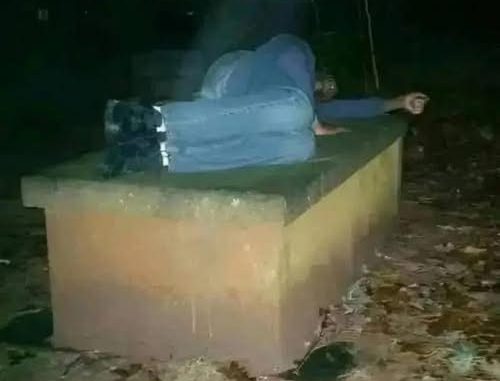
At first, people thought it was strange. Every day, without fail, a man walked to the cemetery, found his mother’s grave, and laid himself down across it. He would stay there through the day, sometimes even through the night. Passersby whispered, some with pity, others with judgment. What kind of man would sleep on a grave, refusing to leave?
But for him, it wasn’t strange at all. His mother’s presence had not ended with her death. To him, the stone marker was not just marble and earth—it was the last doorway to her warmth, the last place he could feel close to her. Sleeping on her grave wasn’t an act of madness. It was an act of devotion.
The Ritual of Grief
The man returned to the cemetery each day like clockwork. Rain, wind, or bitter cold didn’t matter. He curled up on the ground above her, closed his eyes, and let the silence of the cemetery wrap around him. His body rested on the earth, but his mind wandered somewhere else—a place where his mother still existed, where she whispered comfort, where her presence felt real.
Some called it a ritual of sorrow. Others saw extraordinary strength in his persistence. Many people avoided cemeteries altogether, but he had chosen to make one his second home. He endured harsh weather, fatigue, and the judgment of strangers, yet he never faltered.
When questioned by those bold enough to ask why, his answer was simple: “I promised her I’d never leave her side.”
The Morning That Changed Everything
One morning, something shifted. The man awoke just as the first light of dawn stretched across the sky. He felt different, as though the air itself carried a strange charge. For reasons he couldn’t explain, his chest tightened with anticipation.
He turned his head toward the tombstone—and froze.
Before his eyes, his mother’s grave glowed softly. It wasn’t harsh or blinding, but a gentle, dreamlike light, as if the earth itself had opened to release warmth. The grass around the stone seemed greener, touched by dew that shimmered like glass. A light breeze stirred, carrying a faint hum—a sound that was less like music and more like a presence breathing beside him.
His skin prickled, his spine tingled, and for a fleeting moment, he wasn’t afraid. He felt her. He felt her.
A sudden calm washed over him, drowning out months of grief. His tears, usually heavy and endless, slowed. His heart, so long weighed down by sorrow, seemed to lift. For the first time since her death, he didn’t feel crushed by the finality of goodbye. Instead, he felt peace, as though she were telling him: “It’s all right. You can live now.”
Witnessed by Strangers
Others had seen it too. Passersby who stopped in the cemetery that morning were struck silent. Some gasped, some wept. The story spread quickly—about the man who had slept on his mother’s grave every day until the morning her tomb glowed.
People who once mocked him now whispered in awe. Was it a miracle? A sign from beyond? Or simply the power of love taking form? Whatever the explanation, it moved people. For the community, it was no longer a tale of obsession but one of devotion.
His persistence, once misunderstood, had become a symbol of unbreakable bonds. It reminded people that love doesn’t end with death, that the connections of the heart can endure storms, doubt, and even the grave itself.
Saying Goodbye Without Fear
That morning, the man rose slowly, almost reluctantly. His hand lingered on the stone, as if letting go was the hardest thing he’d ever done. But he knew something had changed.
His mother’s presence had not abandoned him. It had simply shifted, no longer tethered to a single place. She lived in his memories, his gestures, his every step forward. And finally, he understood that staying by the grave every night wasn’t the only way to honor her. Living fully, with the love she had given him, was also part of his promise.
When he left the cemetery that day, he didn’t carry despair. He carried peace.
The Meaning of His Vigil
The man’s story became one of quiet legend. People spoke of him not with mockery but with reverence. They said he showed what it means to keep a promise even when the world doesn’t understand. They said his devotion was proof that true love endures even the harshest storms.
His vigil was not just about grief. It was about resilience. About the extraordinary strength required to face loneliness without running from it. About the way bonds between parent and child don’t break with the grave but stretch far beyond it.
In his silent watch, he reminded people that love is not measured in time or presence. It is measured in commitment—the kind that withstands judgment, suffering, and even the passage of death.
Love Beyond the Grave
We often think of death as an ending. For him, it was a beginning of a new form of relationship. Though he could no longer speak to his mother, though he could not hold her hand, he still found a way to keep her close. And in return, whether through faith, imagination, or miracle, he felt her presence again.
His story isn’t just about grief. It’s about the strength of love that transcends all barriers. It is about a son who turned his mourning into a vigil, and a moment of light that turned his despair into acceptance.
For the rest of his life, he carried that morning with him—the glow, the breath, the peace. He no longer slept at the cemetery every night, but he returned often, not with sorrow, but with gratitude.
And each time he stood there, he whispered the same words: “I kept my promise, Mama. And now, I’ll keep living, just as you wanted.”
Leave a Reply